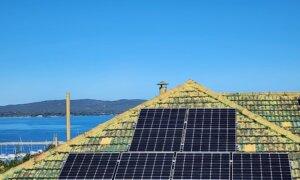A federal climate body suggests that more ambitious emissions reduction goals could be achievable if governments, businesses, investors, and households take additional action.
The bipartisan support for achieving net zero emissions by 2050 is clear, although there is disagreement on the best approach among major political parties.
New South Wales (NSW), Victoria, Queensland, and Tasmania, responsible for three-quarters of the nation’s emissions, have already committed to reducing emissions by at least 70% by 2035.
Australia, as a signatory to the Paris Agreement on climate change, must finalize its first 2035 target in the coming months and submit it by 2025.
Under the Paris Agreement, Australia aims to limit global warming to 1.5 degrees Celsius by reducing emissions compared to 2005 levels.
According to an issues paper released by the Climate Change Authority, Australia could aim to reduce greenhouse gas emissions by 65 to 75 percent by 2035, which would be ambitious yet achievable.
Australia must continue to increase its efforts to meet its commitments for achieving net zero emissions by 2050.
The Climateworks Centre at Monash University suggests that Australia should target an 85% reduction in emissions by 2035.
However, pushing for a faster reduction than 65 to 75 percent could pose economic and social challenges, as noted in the issues paper.
Governments will need to carefully manage public funds, electricity supply, and land access as they pursue emission reduction goals.
Risks associated with the development of renewable energy projects, such as wind farms and solar farms, in farming regions need to be addressed.
Farmers stand to benefit financially from renewable energy projects but must also adapt their practices to reduce emissions and mitigate climate change impacts.
Climate change hazards, including coastal inundation, heatwaves, intense rainfall, and rising temperatures, require proactive measures and adaptation strategies.
Regions affected by climate change are encouraged to develop new industries and provide training for workforce transitions.
The authority emphasizes the need to consider the implications of the transition on regions, including access to essential services.
Climate Change Authority’s Brad Archer invites Australians to share their perspectives on climate change and provide ideas to support workers and communities during the decarbonization process.
Submissions for feedback are open until May 14, with final advice expected by October.








